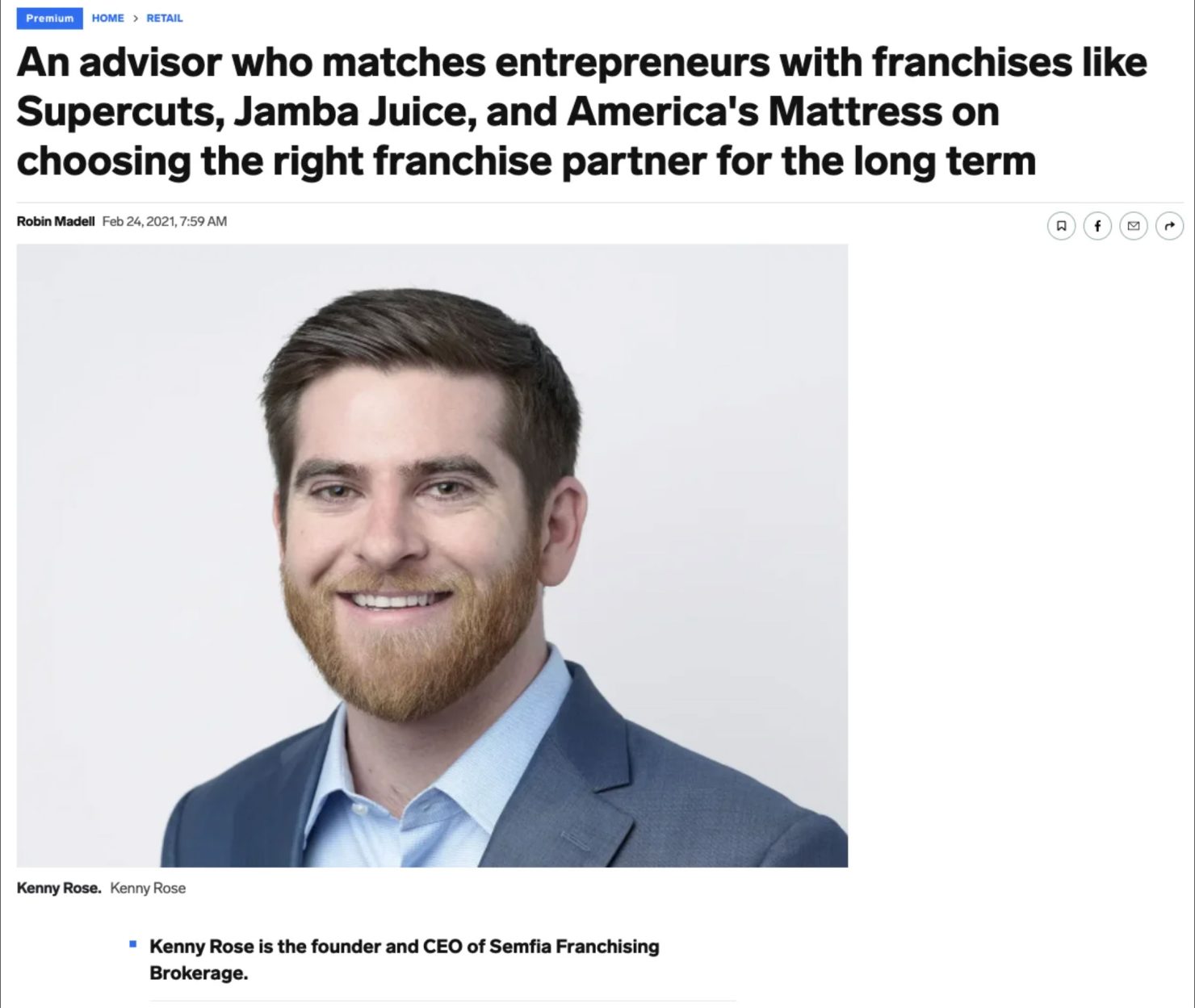Franchising for all: why we’re launching FranShares

The FranShares story starts like many other start-ups… with an idea that hit me like a thunderbolt back in 2014.
At the time, I was sitting on a substantial franchising knowledge base. I was managing half of the LA territory for a franchise brokerage, drawing on my experience working with more than 600 franchise brands across 100 different industries. I would take inventory of the potential owners’ goals, skill sets, and budget, recommend specific franchise brands to research, and then I’d coach them through the research process all the way to actually purchasing a franchise. I even co-authored a book on the franchising space.”
One morning in 2014, I read about Fundrise closing its Series A. The article dove into all the reasons people were psyched about the platform, and raved about how Fundrise was the first investment platform to create a simple, low-cost way for anyone to access an asset class that was typically reserved for the ultra-wealthy.
And that was the moment a world-shaking realization hit me: This fractionalized model could absolutely work for franchise investing.
I didn’t want to launch right away, so I spent a number of years building my business experience and networking more within the industry. I opened my own brokerage in Chicago, and found some unexpected success from a piece I wrote about franchising that I posted on Quora. After that post went viral, it put me on the radar of some major media outlets.
I ended up being a major source for a January 2020 Sunday piece in The Hustle on why a Chick-fil-A only cost $10,000, which went on to become one of the publication’s most popular stories that year. All the while, my idea for a fractionalized franchise investing platform continued simmering in the background. I was later featured in Forbes, ABC, American Express’ blog, and Business Insider, reaching over 300 million people.

And then the pandemic hit. In early lockdown, I read an article about how people were gambling on the stock market because there weren’t any sports to bet on. I immediately kicked myself in the head (figuratively, of course). I thought, “If only I’d had my franchise investing idea going there’d be a billion in assets under management right now.”
So I stopped my brokerage. Just like that – completely, hard stop. I dropped everything to start FranShares. I built a website and went full-steam ahead, picking brains and making connections. When I pitched FranShares to our law firm, they were so confident that we would address the issues facing the franchise investing space that they waived any fees until we got our first check from an outside investor.
Franchise Investing: The Status Quo
Investing in a franchise location has always required a certain level of knowledge on the part of the investor, as well as a functional understanding of how the franchise business model works. During my years at the brokerage, I found that investors looking for a passive income stream would typically be confronted with three primary obstacles when evaluating a franchise opportunity: upfront costs, time, and operational expertise.
- Upfront costs: Investment capital is one of the primary barriers to establishing a franchise location. Costs for licensing, real estate, materials, and fees can start at $100,000 – and that only covers the cash outlay portion of the investment. Often, franchise owners need more than $1M in additional liquid assets. Depending on the industry and location, it can take many years to achieve profitability.
- Time: Traditional franchise investment is not a purely passive income model. Although running a franchise location is easier than starting from scratch with a single-location business, it is still a time-consuming process. As the franchisee, you are responsible for implementing the management and marketing plans laid out by your franchisor. Standard operations like hiring, personnel management, ordering, and scheduling all require a time investment.
- Operational expertise: As with running any business, operating a franchise business requires a certain level of management knowledge. Franchise operators must be able to perform due diligence on the investment and must understand the market forces at play in establishing and running a franchise location. While the licensing agreement entitles the franchisee to benefit from branding and marketing, the success of the location hinges heavily upon the ability of operators to successfully run and promote the business.
With these challenges in mind, many investors decide that franchise ownership doesn’t make sense for their financial situation or their lifestyle. And on that otherwise unassuming day in 2014, I knew I had found a way to bridge the gap with a business model that would be totally novel for the industry.
Welcome to FranShares
You may already have some familiarity with fractionalized investing, which allows pools of individuals to invest in expensive assets like vacation homes, artwork, private jets, and racehorses. With FranShares, we’ve taken this method of ownership and applied it to franchise investing. Our approach allows both accredited and non-accredited investors from all walks of life to purchase partial ownership in a portfolio of pre-vetted, managed franchise locations with high-return potential – for as little as $500.
How We Select Franchises
We leverage years of franchise investing experience when selecting which franchises to invest in.
One of our first concerns is return on investment (ROI). Franchising is regulated by the Federal Trade Commission (FTC) for full transparency. As part of FTC regulation, franchises must disclose their full itemized start-up costs. They also have the option of disclosing a Financial Performance Representation (FPR) of their locations, which may come in the form of gross revenue, net profit, number of customers, etc.
FranShares prefers to work only with franchises that show net profits in their FPR, which allows our investors to have a better understanding of potential returns. We tend to avoid franchises with high build-out costs, employee headcounts, and inventory to maximize ROI.
In addition to potential returns, FranShares looks for experienced teams based on their involvement in their franchise’s industry and in franchising as a whole. We also look for growing franchise brands that have availability for multiple locations in good markets. To ensure the brand is growing, we drill down into each franchise’s growth per location, store sales, and the number of franchisees.
How We Manage Franchises
FranShares invests in locally operated franchise locations alongside our pool of investors. We act as the manager for each location and distribute the resulting recurring franchise profits to each investor.
FranShares also remains a co-owner and stakeholder in our investment portfolios. We assume all management responsibilities for our franchise locations and appoint teams who are experts at creating successful franchise businesses. This allows FranShares investors to enjoy returns on their investments while avoiding the stress and responsibilities of full franchise ownership.
The FranShares Vision
We’ve been working nonstop to create an offering that allows both accredited and unaccredited investors to invest with FranShares. But along the way, we learned that creating this type of wide-reaching offering (known as Regulation A+) was taking too much time; and this portfolio of brands provides too many benefits to investors to wait any longer.
So, to get this offering to investors as quickly as possible, we’re instead structuring our initial offering as a Regulation D, which allows us to move much faster – but also means that investors in our first offering, TNT Franchise Fund Inc., must be accredited investors.
While our first offering is available only to accredited investors, we are preparing offerings that allow any and everyone to invest, regardless of their accreditation status.
Some will invariably find this approach rather alien; but it’s a fact that accredited and unaccredited investors working together in this type of investment is what makes it so successful in the long term. Big check writers are key to creating economies of scale, but it’s the smaller check writers that help build the community connection.
Just look at what happened on Wall Street when the “small checks” banded together behind GameStop. When you think about why companies franchise, part of it is the money – and the other part is the local boots on the ground. They want someone who’s personally vested in it.
So we’ve thought about that on a larger scale. Imagine the traffic you could get from having hundreds or thousands of people advocating for your business. The small check investors are going to be customers and they will tell their friends about it.
That is franchising on steroids.
Another reason we’re making franchise investing available to both accredited and unaccredited investors is that social equity and creating generational wealth are very important to me. In the current system of franchising, there’s a massive gap between the owners and the people working in their locations. These are minimum wage employees who may have no chance of ever owning a business – and we want to change that.
Our goal with FranShares is to create a new ladder system in which a new hire can start a minimum wage job and see a clear-cut path toward eventually becoming a manager, then an owner, then running a portfolio, and then even working at FranShares corporate.
I want this to be something that helps people be happy with what they’re doing. There is no real downside; a system like this creates better opportunities for people and, in turn, better service for customers. Rather than creating dead-end jobs, I want FranShares to help build a tangible future for people.
How You Can Get Involved
Investors have long thought of franchise ownership as a preferred method of achieving stable investment portfolio diversification. It offers high-yield returns, a predictable investment timetable, and resistance to both inflation and recession. The franchise model also offers a low-volatility investment vehicle that is carefully regulated.
If you’re an investor who wants to add these features to your portfolio – while simultaneously generating a truly passive stream of income – FranShares is your ideal partner.
Our TNT Franchise Fund Inc. offering is now live and open for investments. We encourage everyone interested in this asset class to start the due diligence process and begin investing using today.


